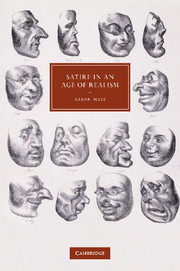Description
Satire in an Age of Realism
Cambridge Studies in Nineteenth-Century Literature and Culture Series
Author: Matz Aaron
Explores how realism in the nineteenth century became so extreme in its portrayal of human experience that it blurred into satire.
Language: EnglishApproximative price 31.58 €
In Print (Delivery period: 14 days).
Add to cart
Satire in an Age of Realism
Publication date: 11-2013
Support: Print on demand
Publication date: 11-2013
Support: Print on demand
Approximative price 104.26 €
In Print (Delivery period: 14 days).
Add to cart
Satire in an age of realism
Publication date: 07-2010
240 p. · 16x23.5 cm · Hardback
Publication date: 07-2010
240 p. · 16x23.5 cm · Hardback
Description
/li>Contents
/li>Biography
/li>
As nineteenth-century realism became more and more intrepid in its pursuit of describing and depicting everyday life, it blurred irrevocably into the caustic and severe mode of literature better named satire. Realism's task of portraying the human became indistinguishable from satire's directive to castigate the human. Introducing an entirely new way of thinking about realism and the Victorian novel, Aaron Matz refers to the fusion of realism and satire as 'satirical realism': it is a mode in which our shared folly and error are so entrenched in everyday life, and so unchanging, that they need no embellishment when rendered in fiction. Focusing on the novels of Eliot, Hardy, Gissing, and Conrad, and the theater of Ibsen, Matz argues that it was the transformation of Victorian realism into satire that granted it immense moral authority, but that led ultimately to its demise.
1. Augustan satire and Victorian realism; 2. Terminal satire and Jude the Obscure; 3. George Gissing's ambivalent realism; 4. The English critics and the Norwegian satirist; 5. Truth and caricature in The Secret Agent; Epilogue.
Aaron Matz is Assistant Professor of English at Scripps College, California.
© 2024 LAVOISIER S.A.S.





